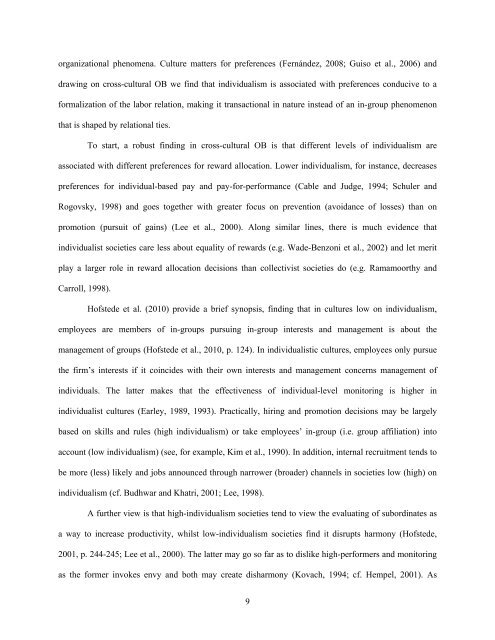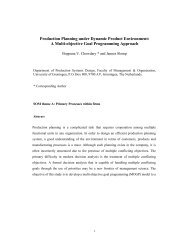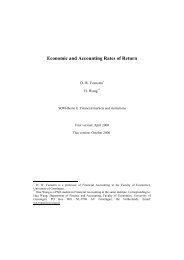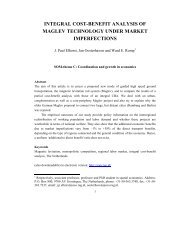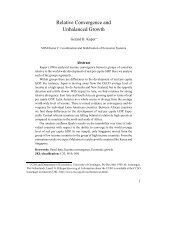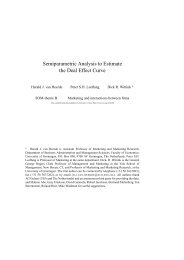Individualism and the cultural roots of management practices
Individualism and the cultural roots of management practices
Individualism and the cultural roots of management practices
You also want an ePaper? Increase the reach of your titles
YUMPU automatically turns print PDFs into web optimized ePapers that Google loves.
organizational phenomena. Culture matters for preferences (Fernández, 2008; Guiso et al., 2006) <strong>and</strong><br />
drawing on cross-<strong>cultural</strong> OB we find that individualism is associated with preferences conducive to a<br />
formalization <strong>of</strong> <strong>the</strong> labor relation, making it transactional in nature instead <strong>of</strong> an in-group phenomenon<br />
that is shaped by relational ties.<br />
To start, a robust finding in cross-<strong>cultural</strong> OB is that different levels <strong>of</strong> individualism are<br />
associated with different preferences for reward allocation. Lower individualism, for instance, decreases<br />
preferences for individual-based pay <strong>and</strong> pay-for-performance (Cable <strong>and</strong> Judge, 1994; Schuler <strong>and</strong><br />
Rogovsky, 1998) <strong>and</strong> goes toge<strong>the</strong>r with greater focus on prevention (avoidance <strong>of</strong> losses) than on<br />
promotion (pursuit <strong>of</strong> gains) (Lee et al., 2000). Along similar lines, <strong>the</strong>re is much evidence that<br />
individualist societies care less about equality <strong>of</strong> rewards (e.g. Wade-Benzoni et al., 2002) <strong>and</strong> let merit<br />
play a larger role in reward allocation decisions than collectivist societies do (e.g. Ramamoorthy <strong>and</strong><br />
Carroll, 1998).<br />
H<strong>of</strong>stede et al. (2010) provide a brief synopsis, finding that in cultures low on individualism,<br />
employees are members <strong>of</strong> in-groups pursuing in-group interests <strong>and</strong> <strong>management</strong> is about <strong>the</strong><br />
<strong>management</strong> <strong>of</strong> groups (H<strong>of</strong>stede et al., 2010, p. 124). In individualistic cultures, employees only pursue<br />
<strong>the</strong> firm’s interests if it coincides with <strong>the</strong>ir own interests <strong>and</strong> <strong>management</strong> concerns <strong>management</strong> <strong>of</strong><br />
individuals. The latter makes that <strong>the</strong> effectiveness <strong>of</strong> individual-level monitoring is higher in<br />
individualist cultures (Earley, 1989, 1993). Practically, hiring <strong>and</strong> promotion decisions may be largely<br />
based on skills <strong>and</strong> rules (high individualism) or take employees’ in-group (i.e. group affiliation) into<br />
account (low individualism) (see, for example, Kim et al., 1990). In addition, internal recruitment tends to<br />
be more (less) likely <strong>and</strong> jobs announced through narrower (broader) channels in societies low (high) on<br />
individualism (cf. Budhwar <strong>and</strong> Khatri, 2001; Lee, 1998).<br />
A fur<strong>the</strong>r view is that high-individualism societies tend to view <strong>the</strong> evaluating <strong>of</strong> subordinates as<br />
a way to increase productivity, whilst low-individualism societies find it disrupts harmony (H<strong>of</strong>stede,<br />
2001, p. 244-245; Lee et al., 2000). The latter may go so far as to dislike high-performers <strong>and</strong> monitoring<br />
as <strong>the</strong> former invokes envy <strong>and</strong> both may create disharmony (Kovach, 1994; cf. Hempel, 2001). As<br />
9


